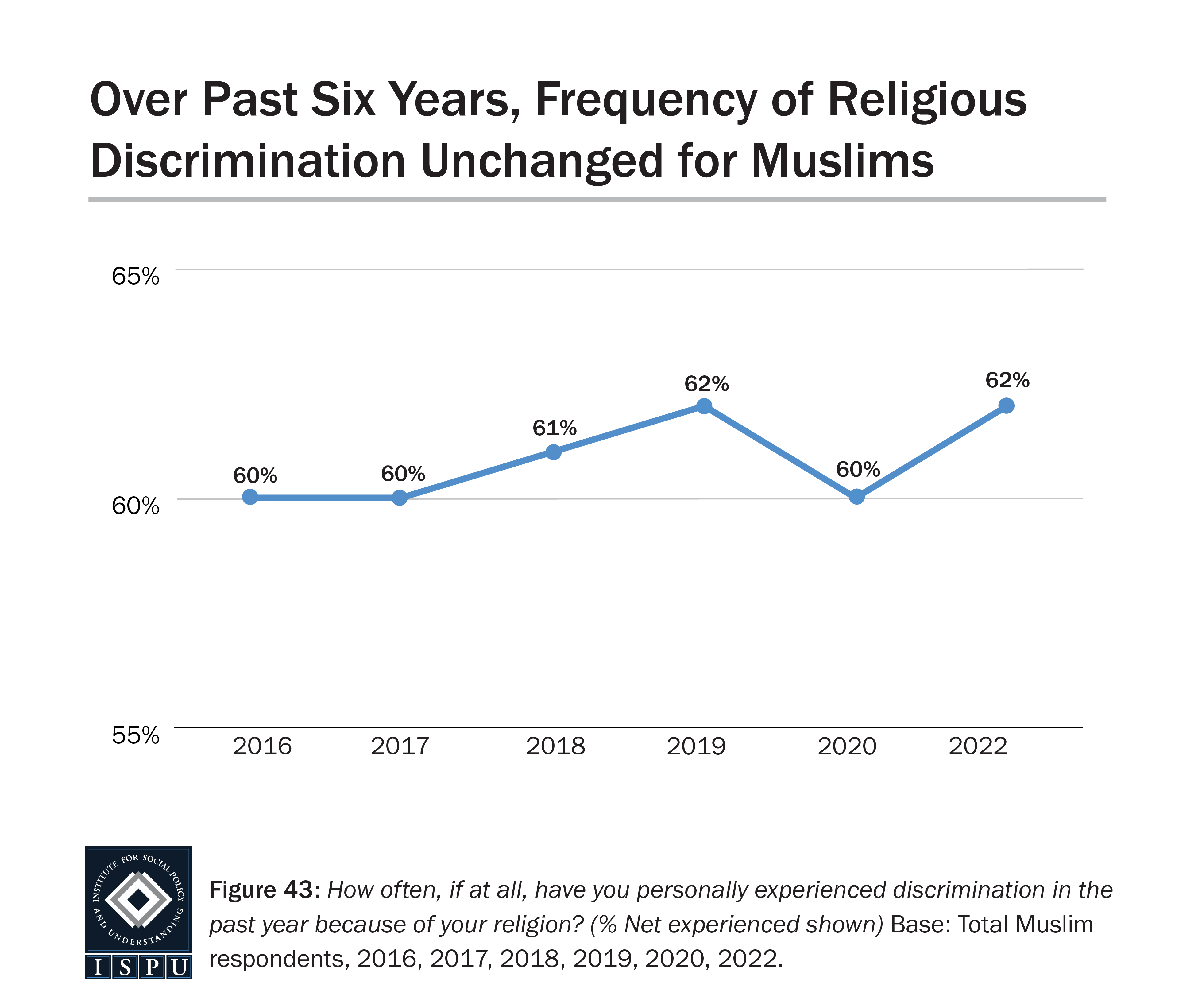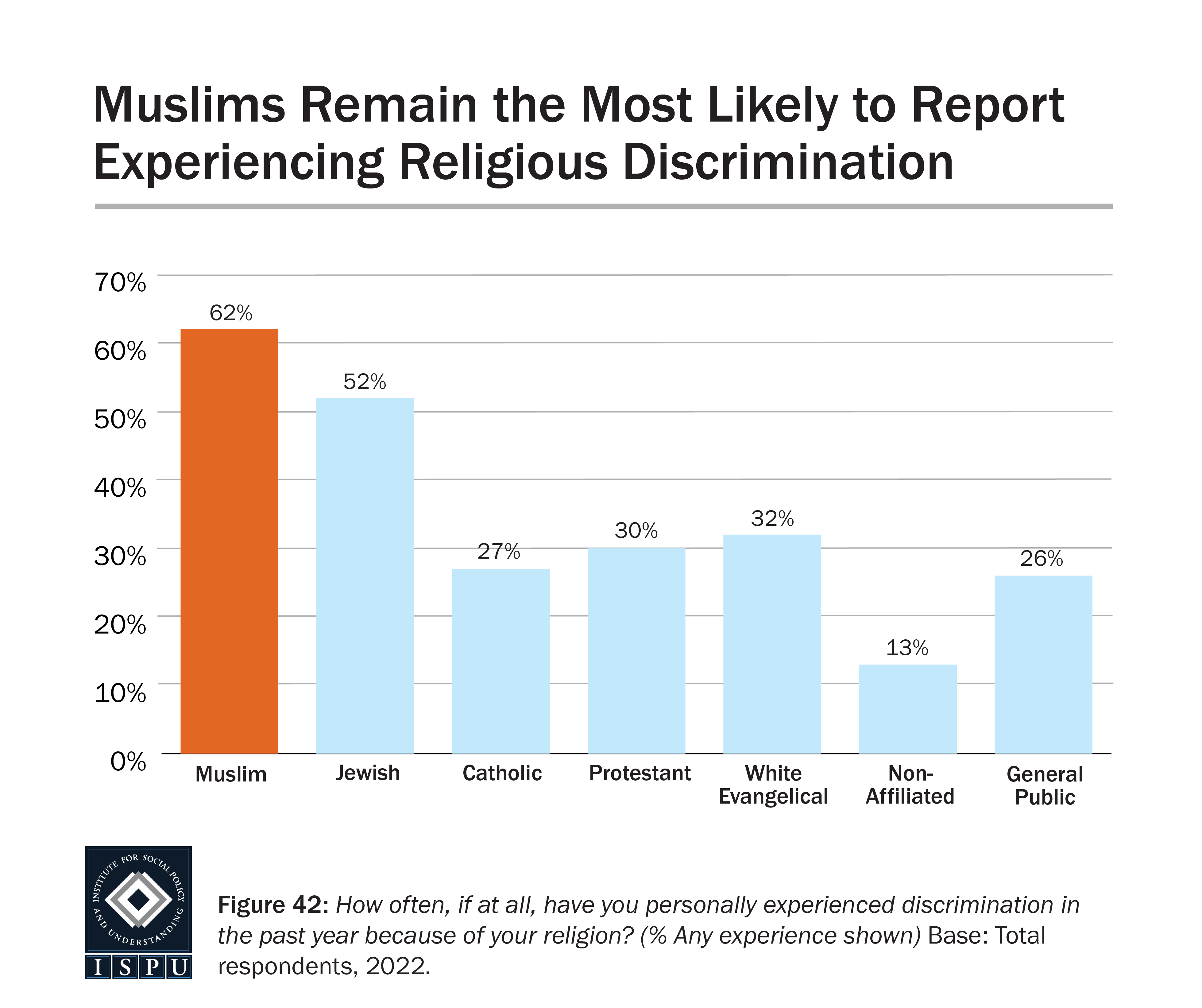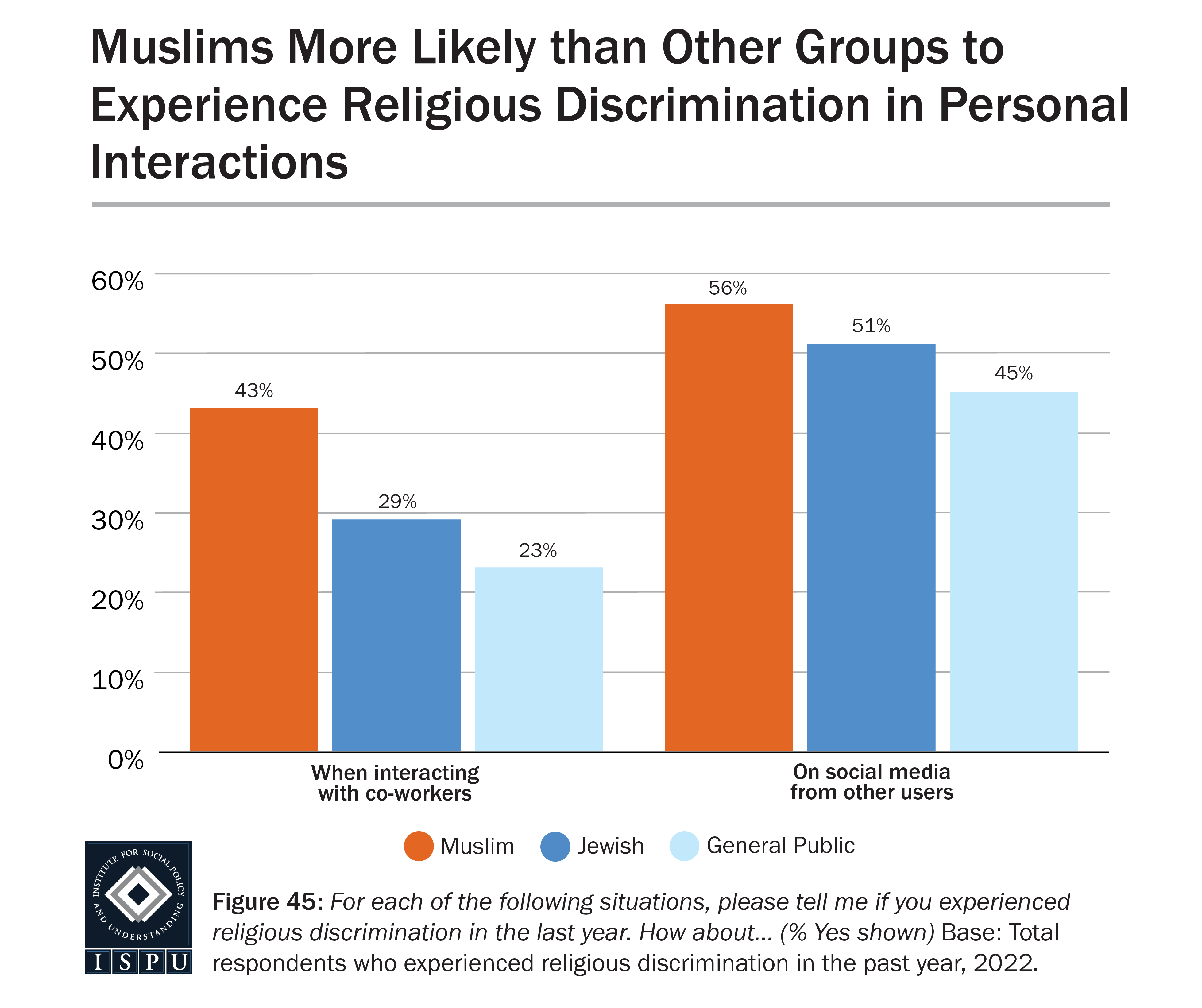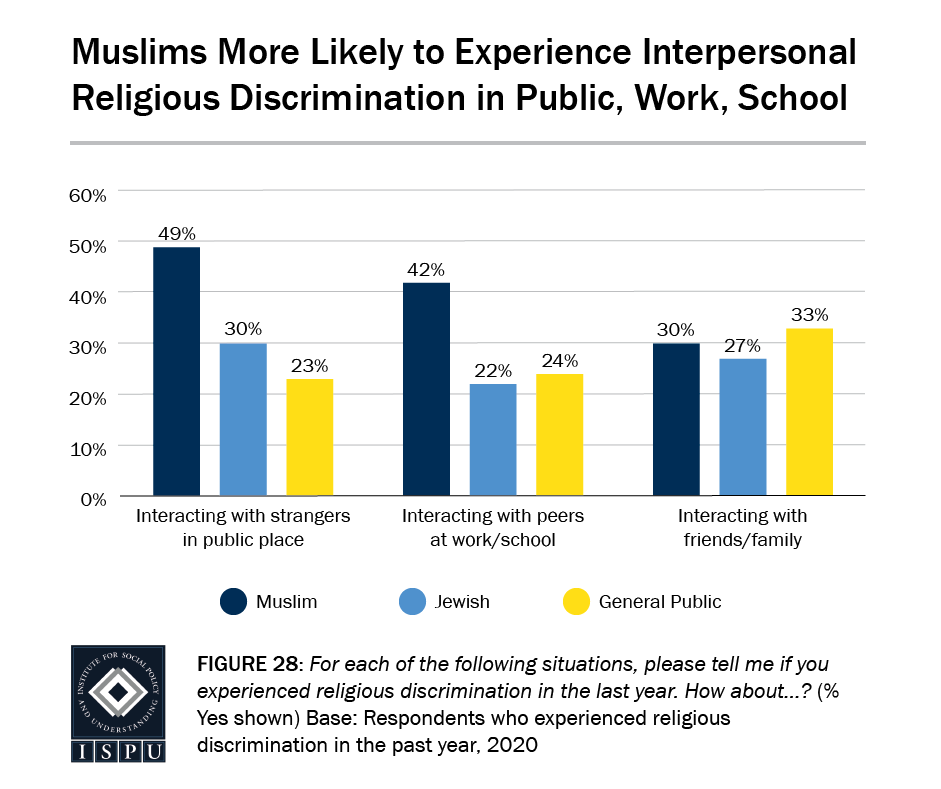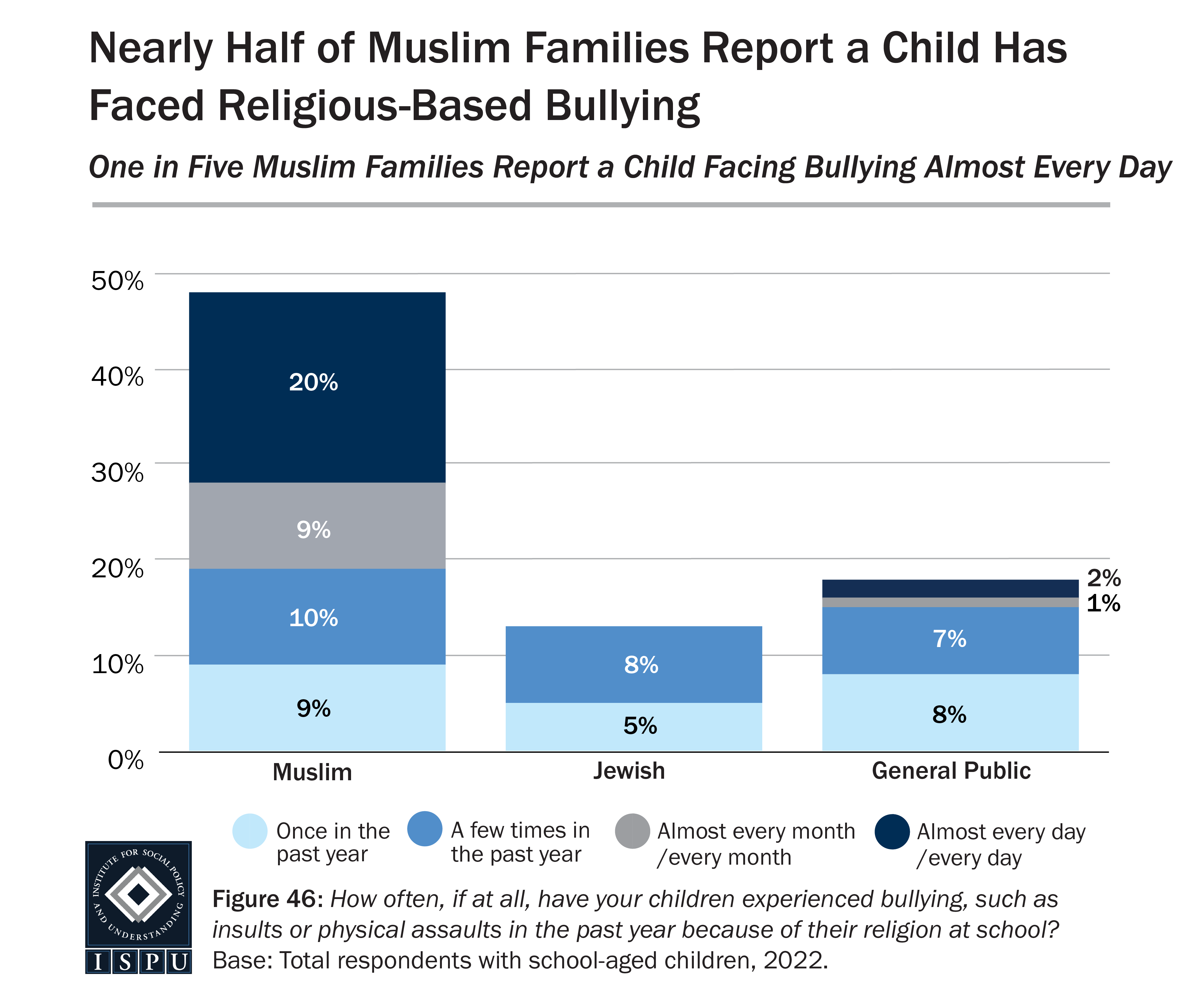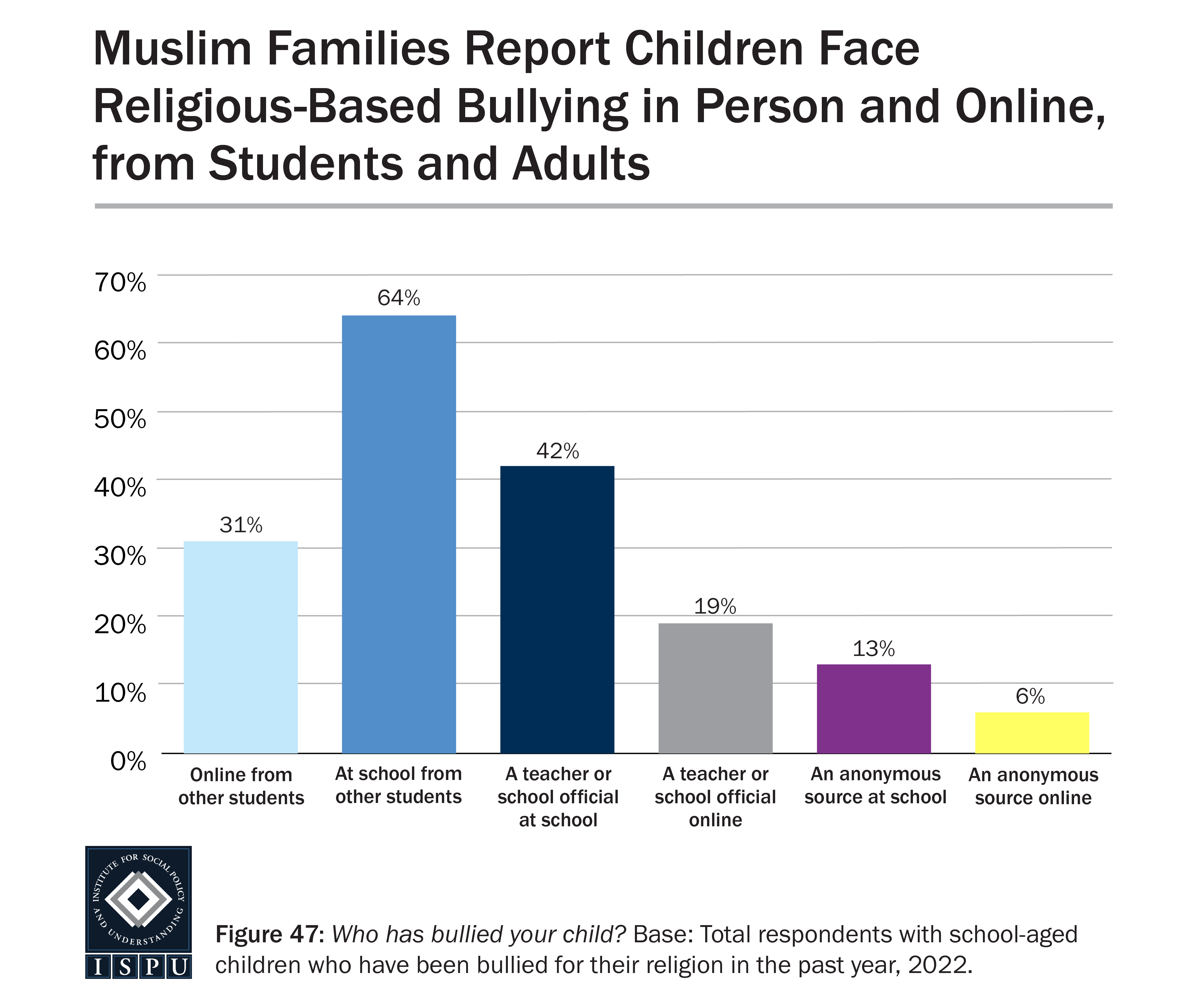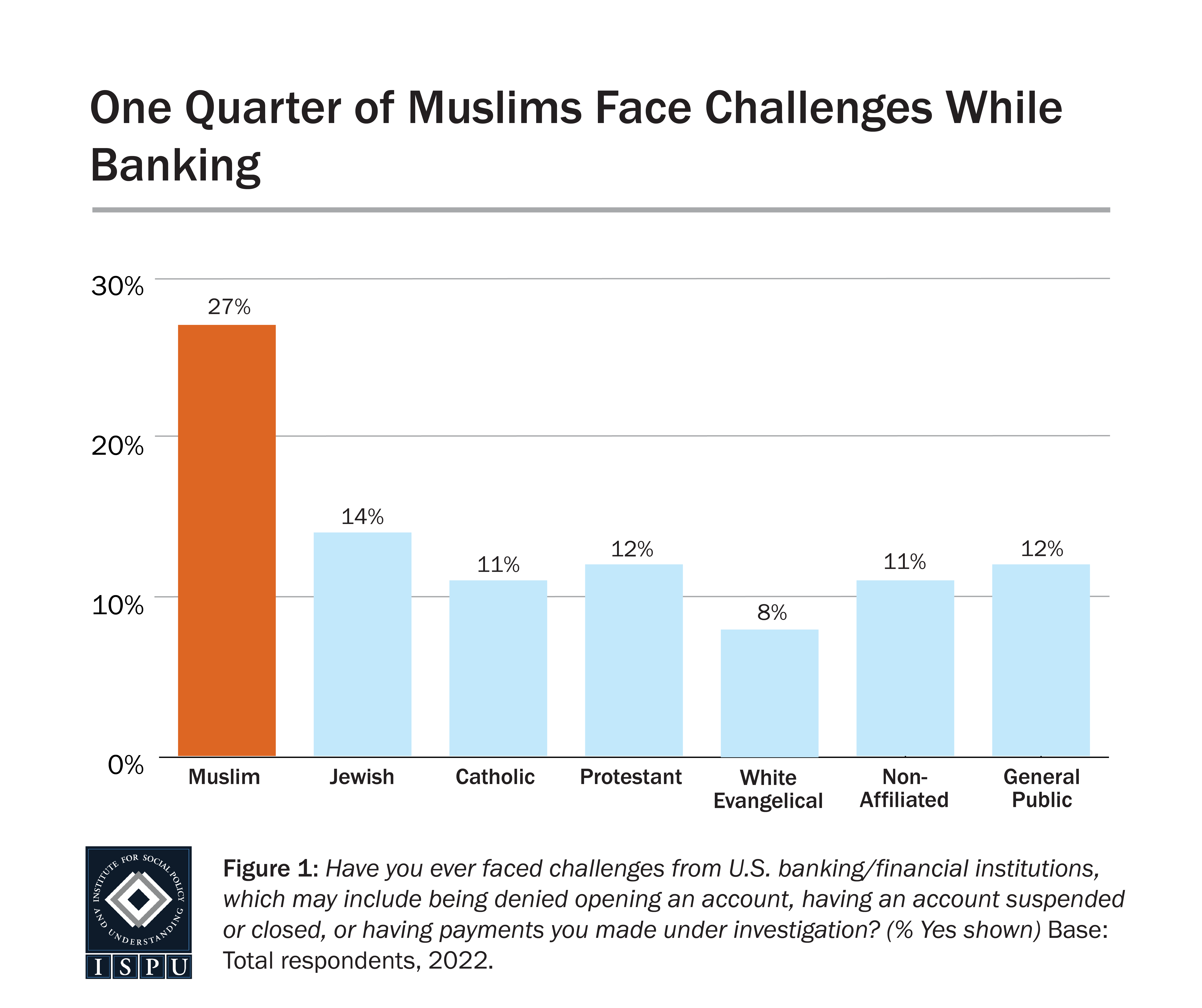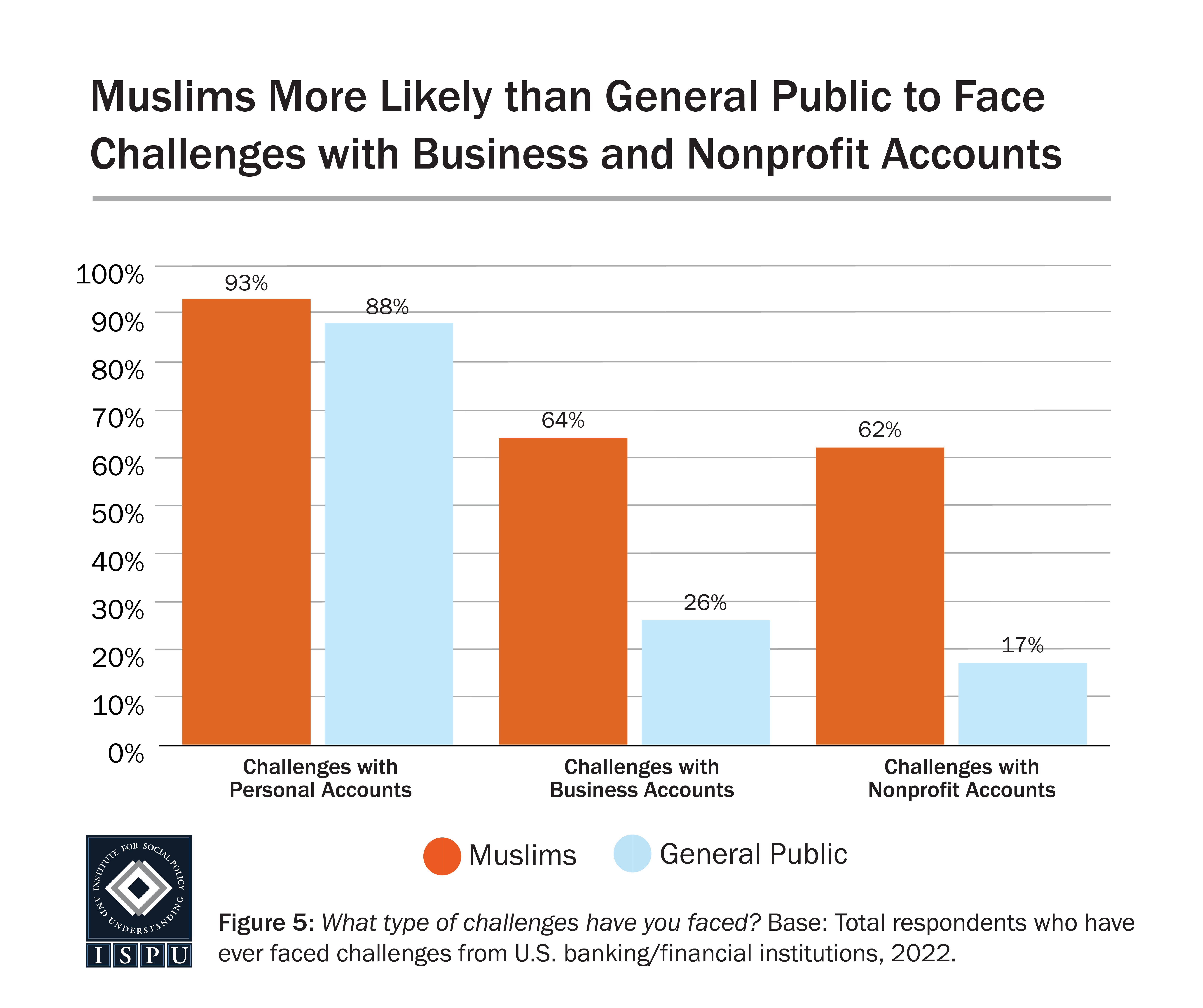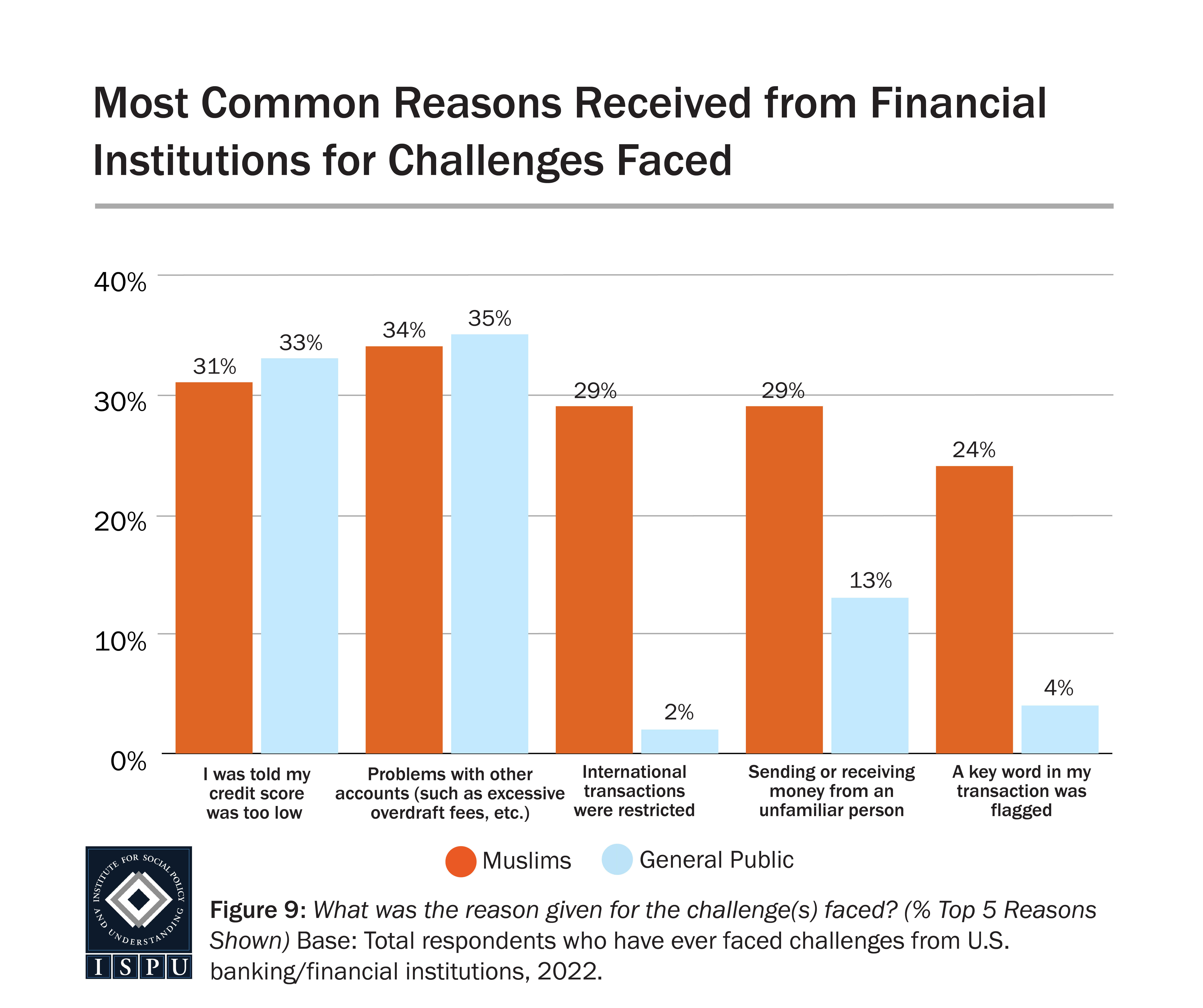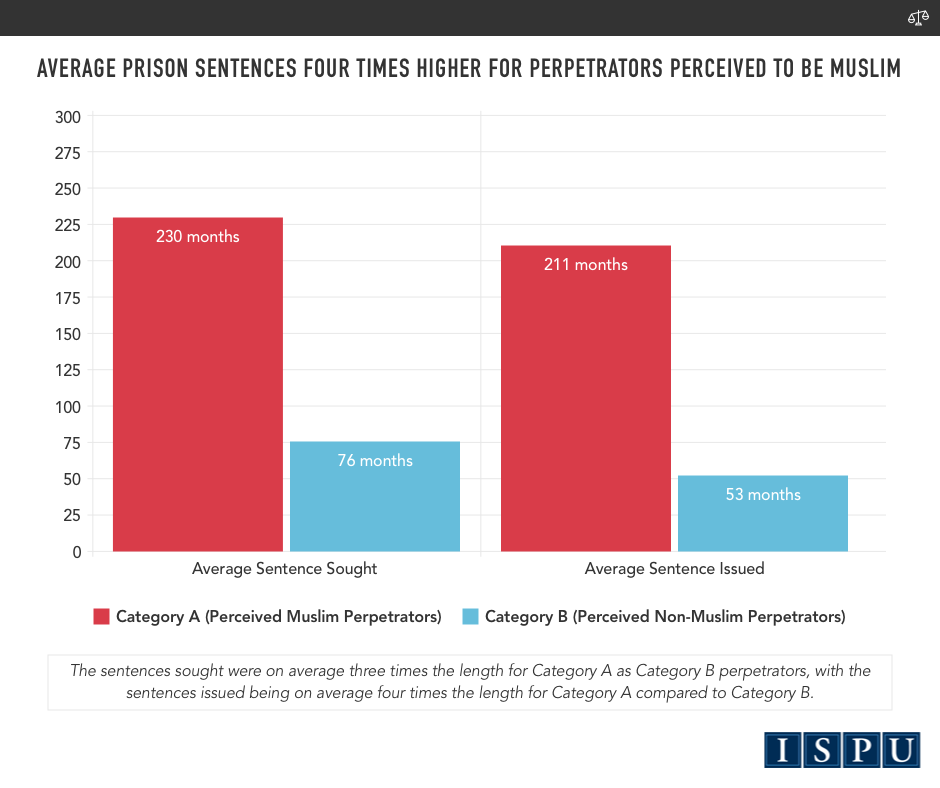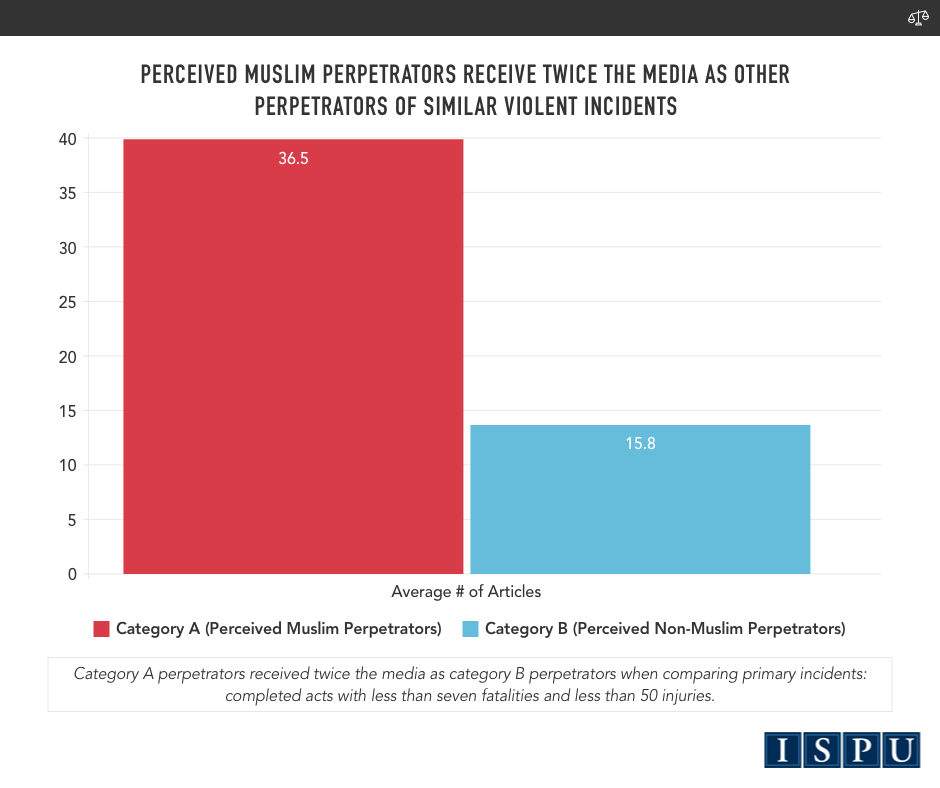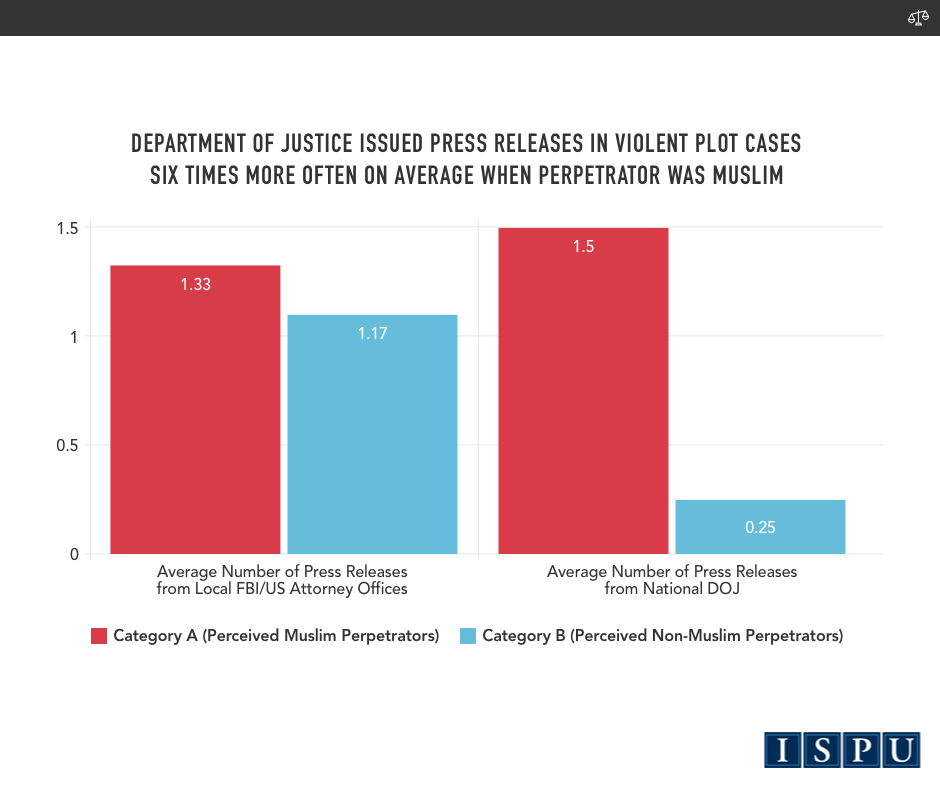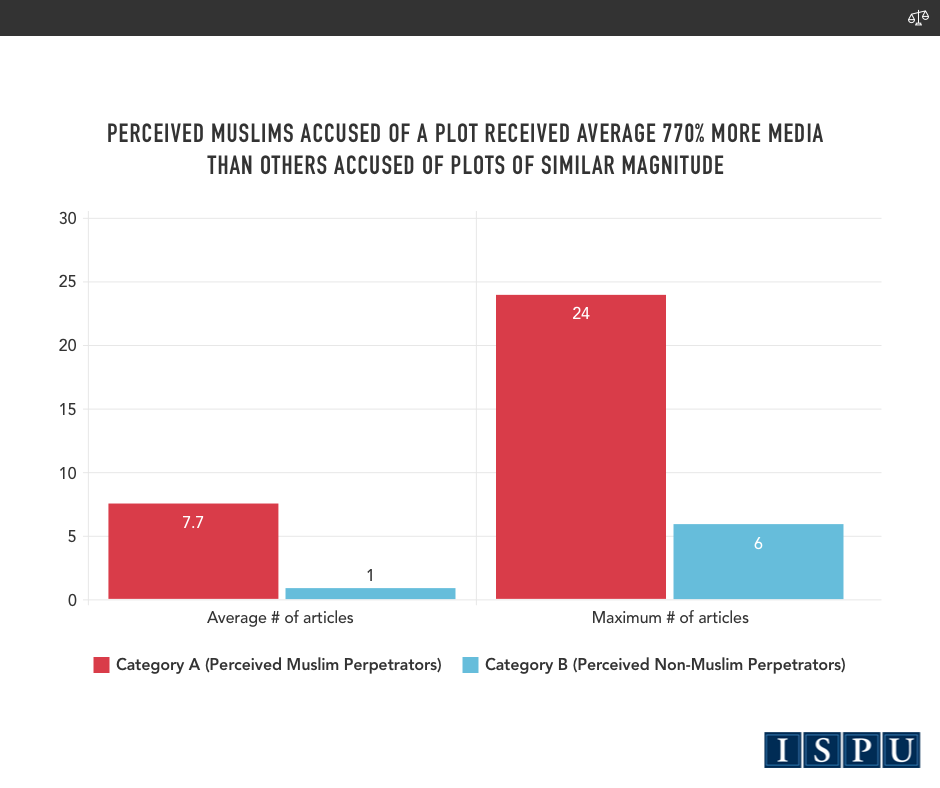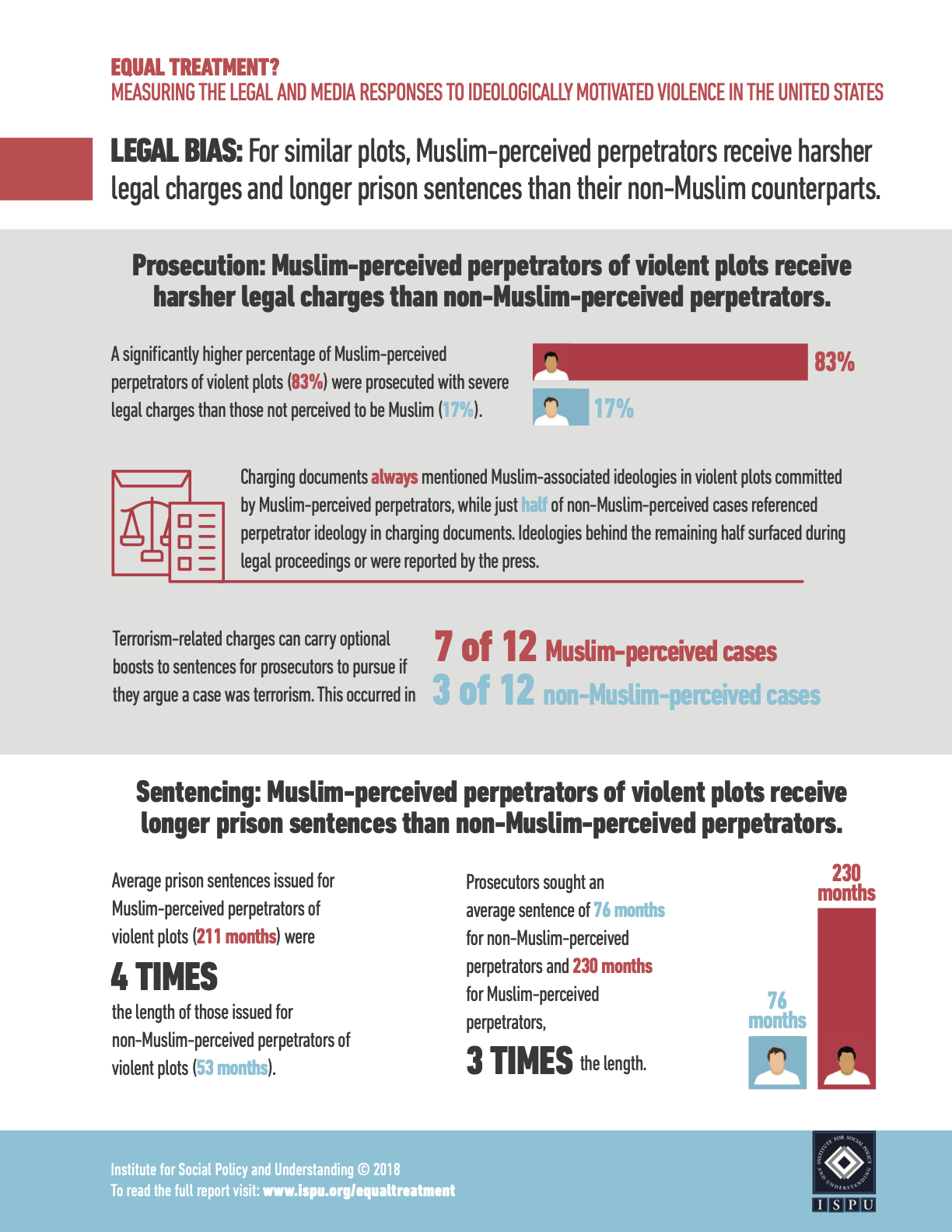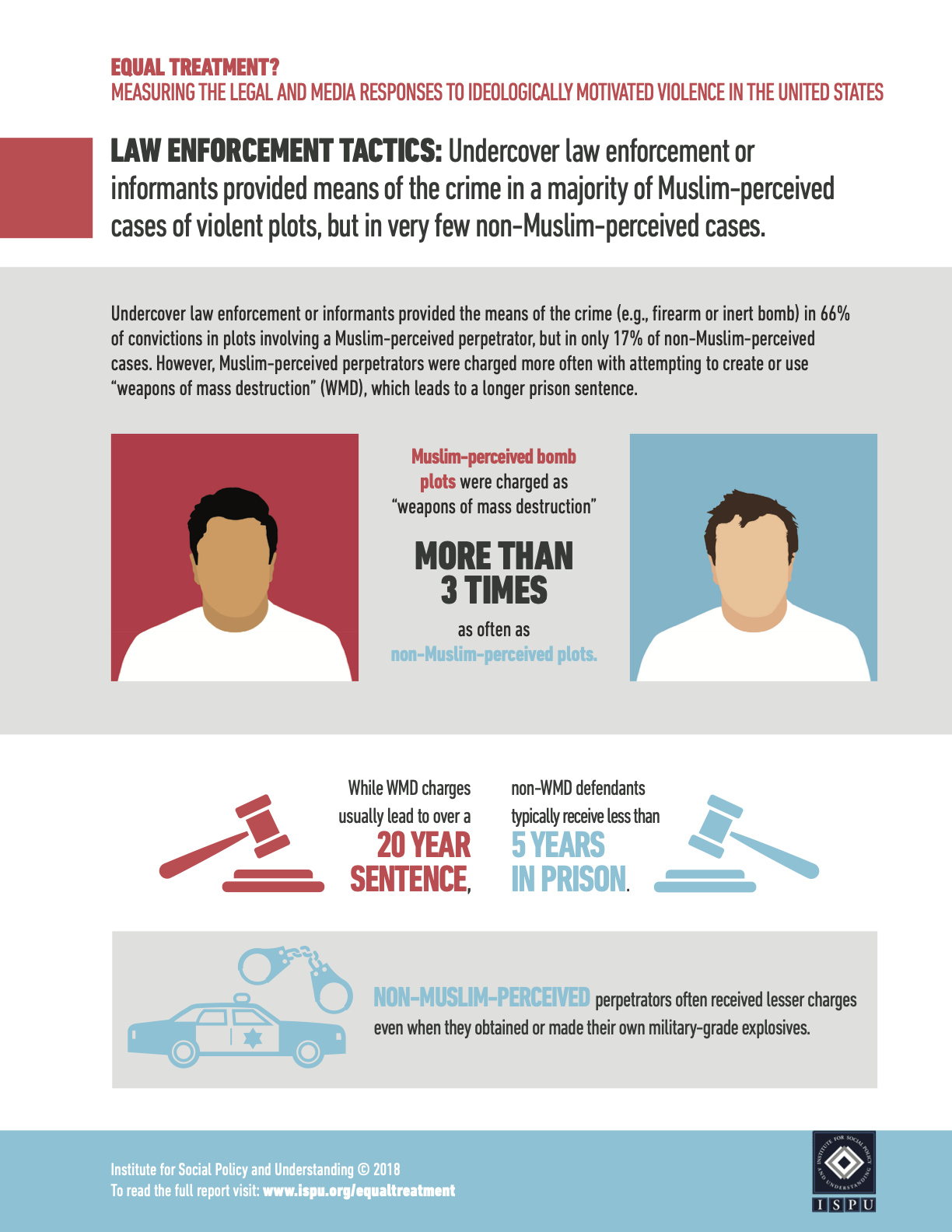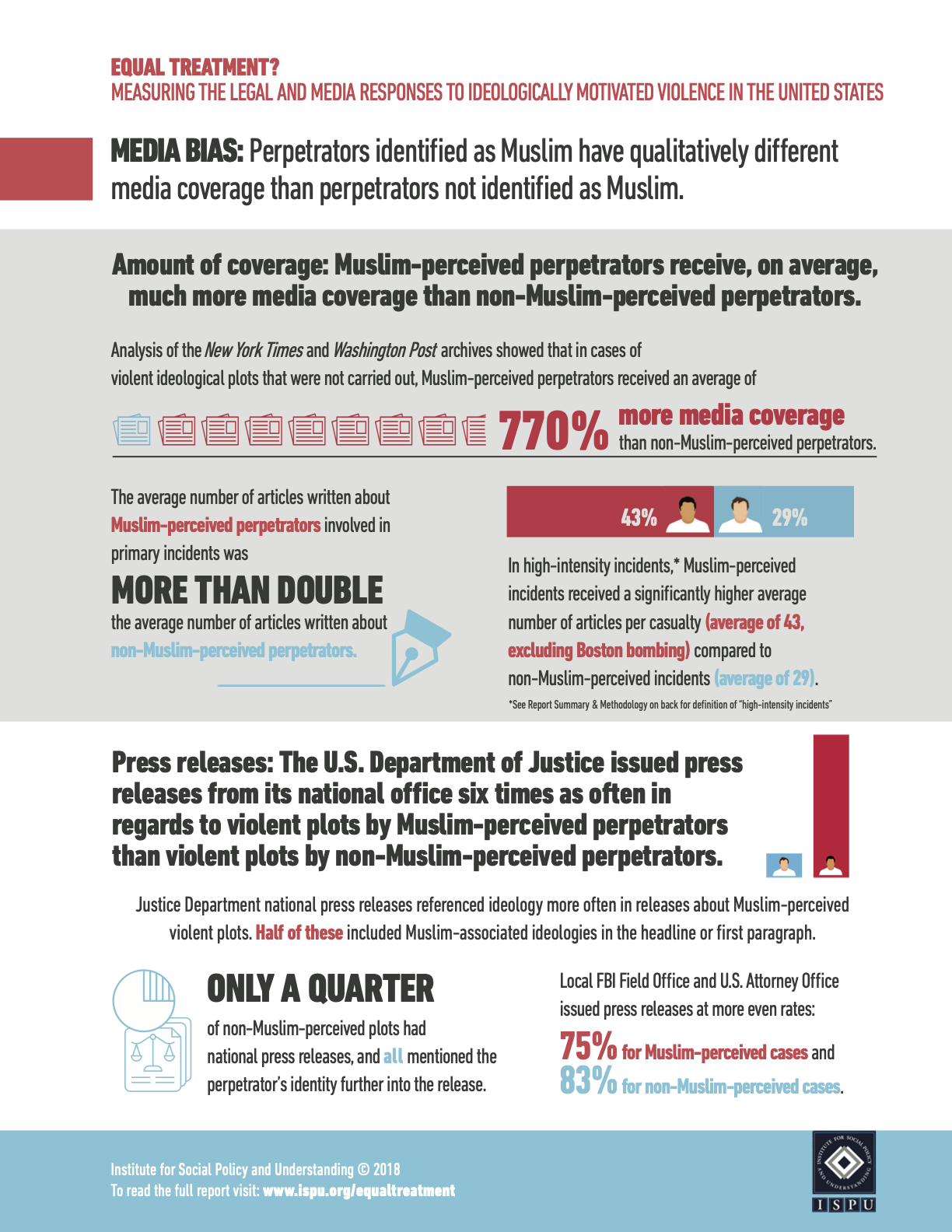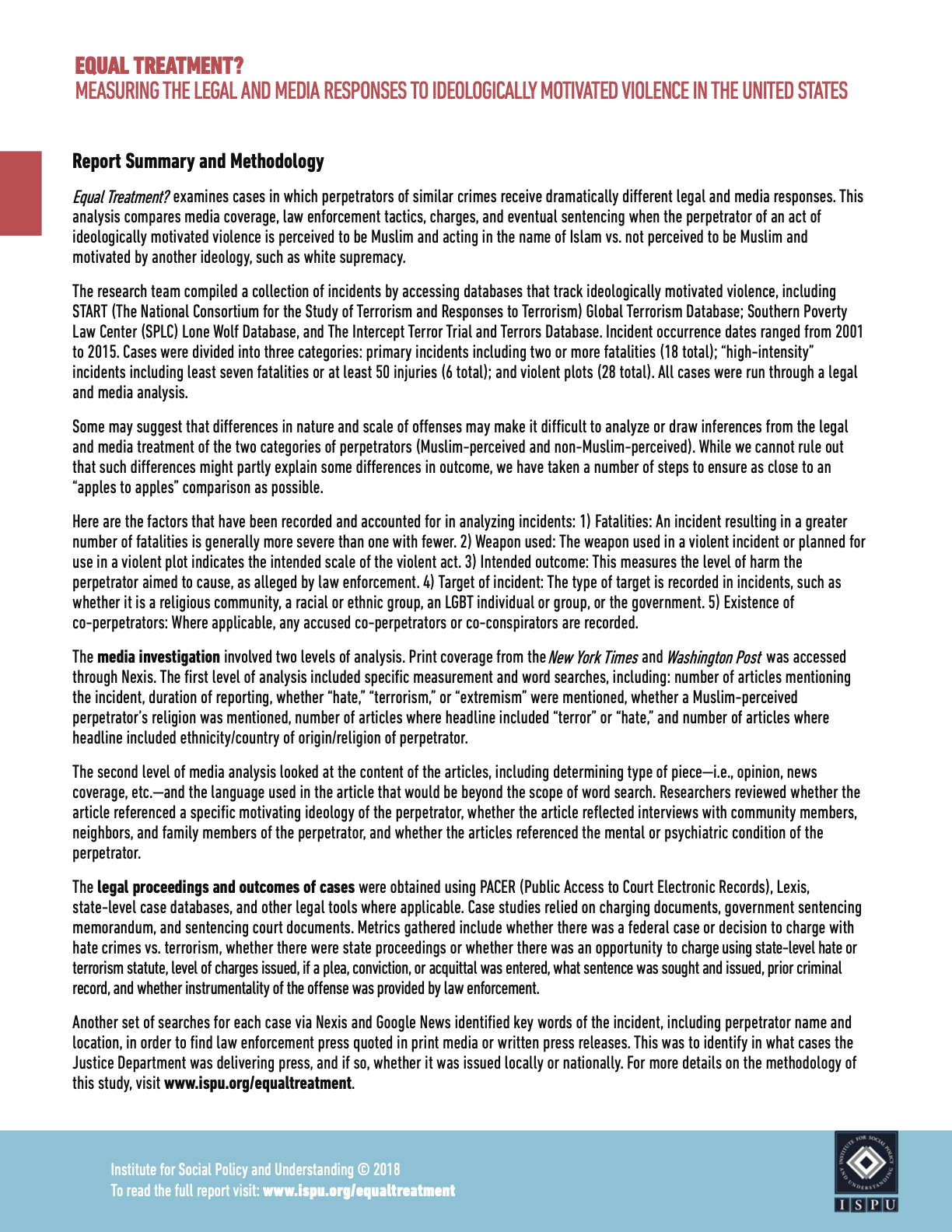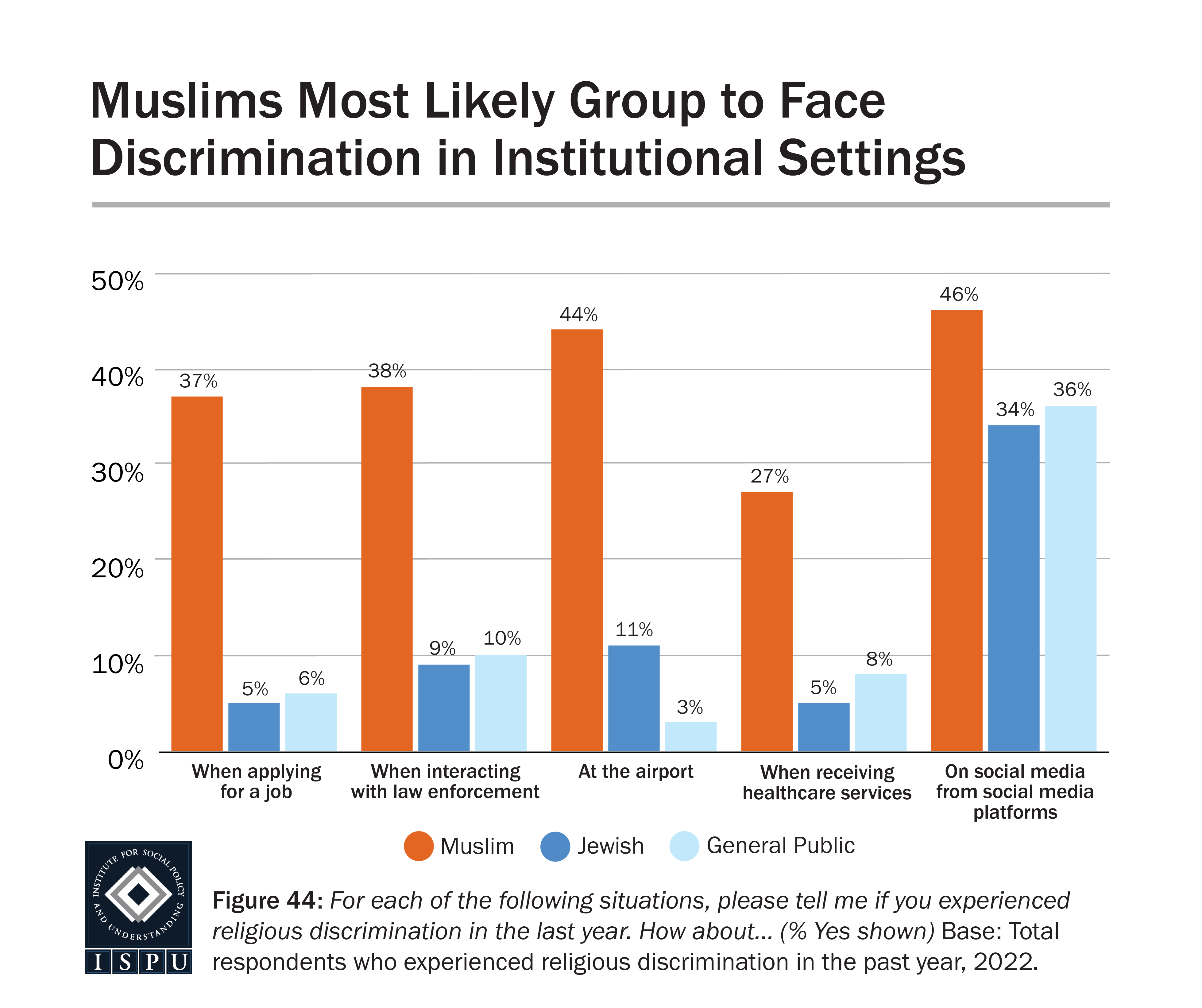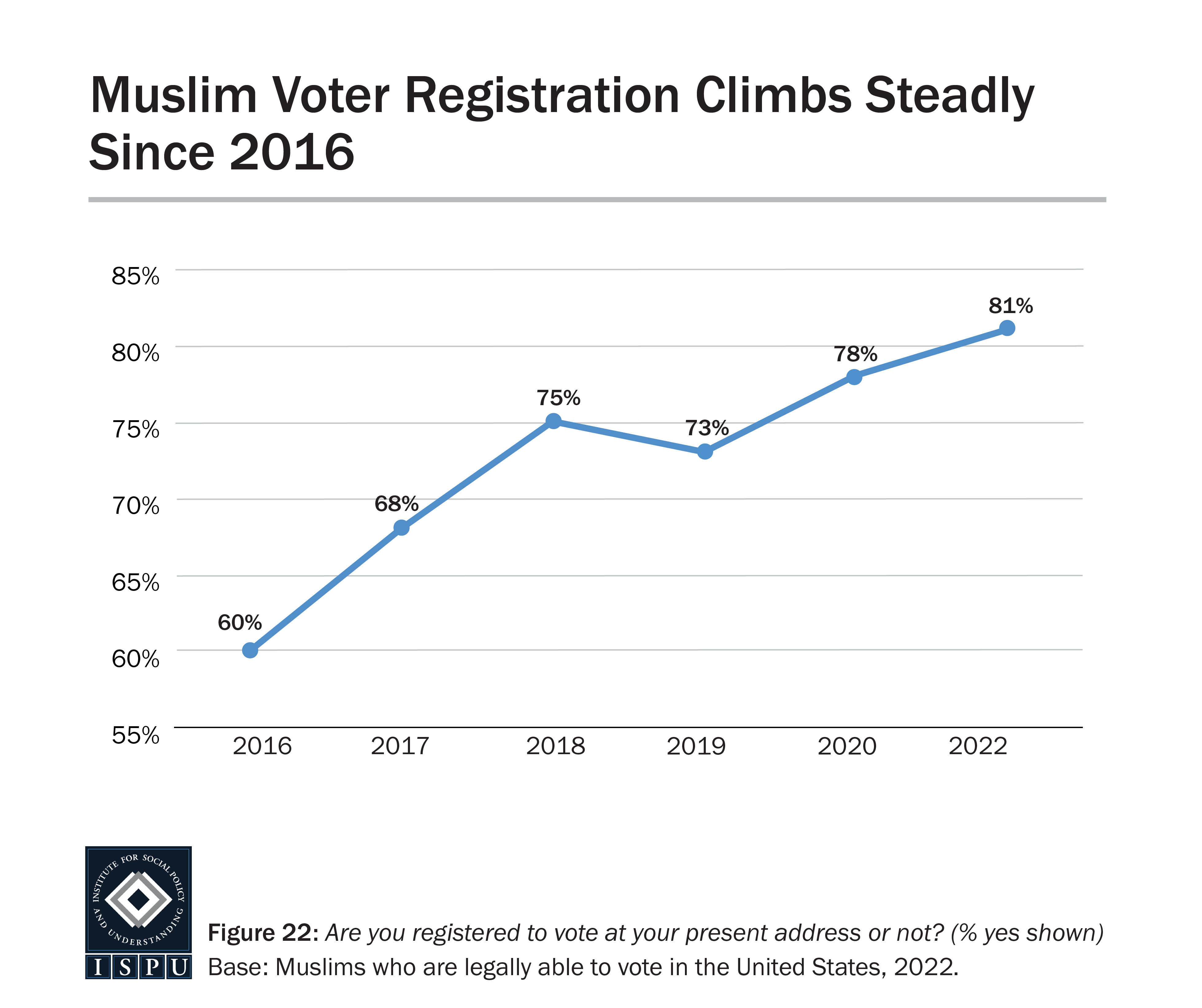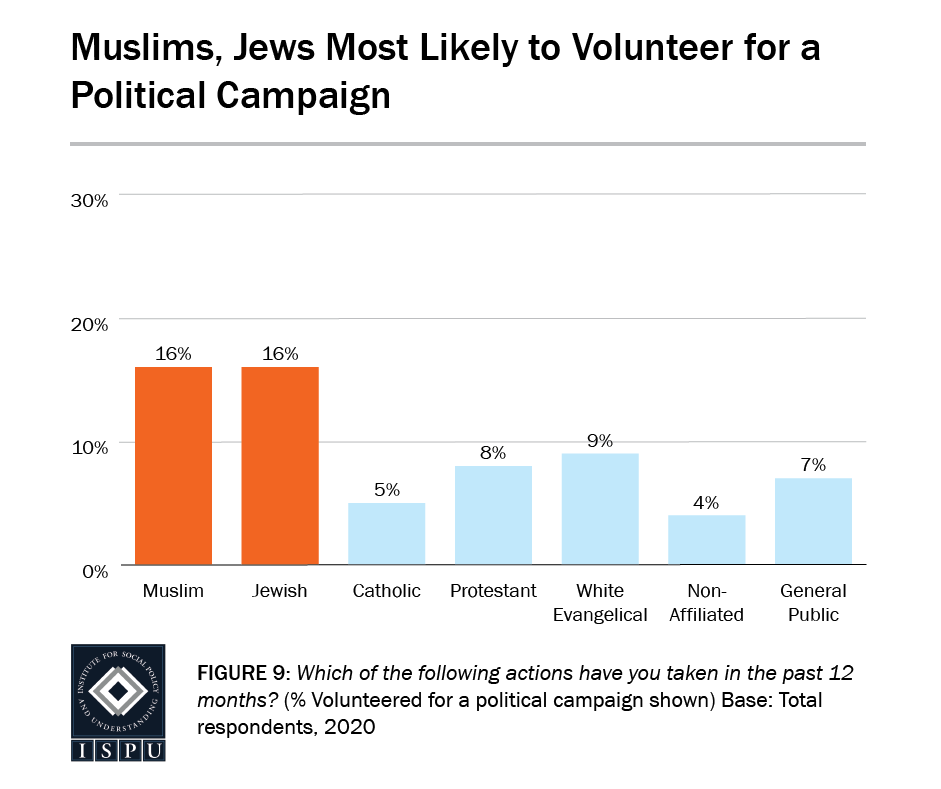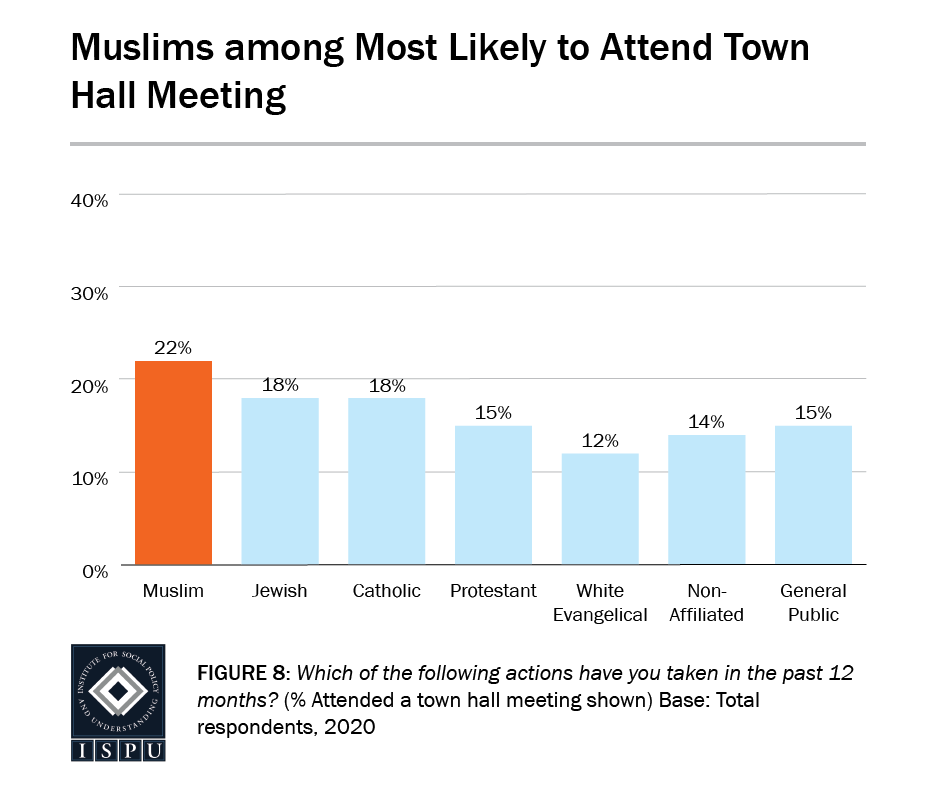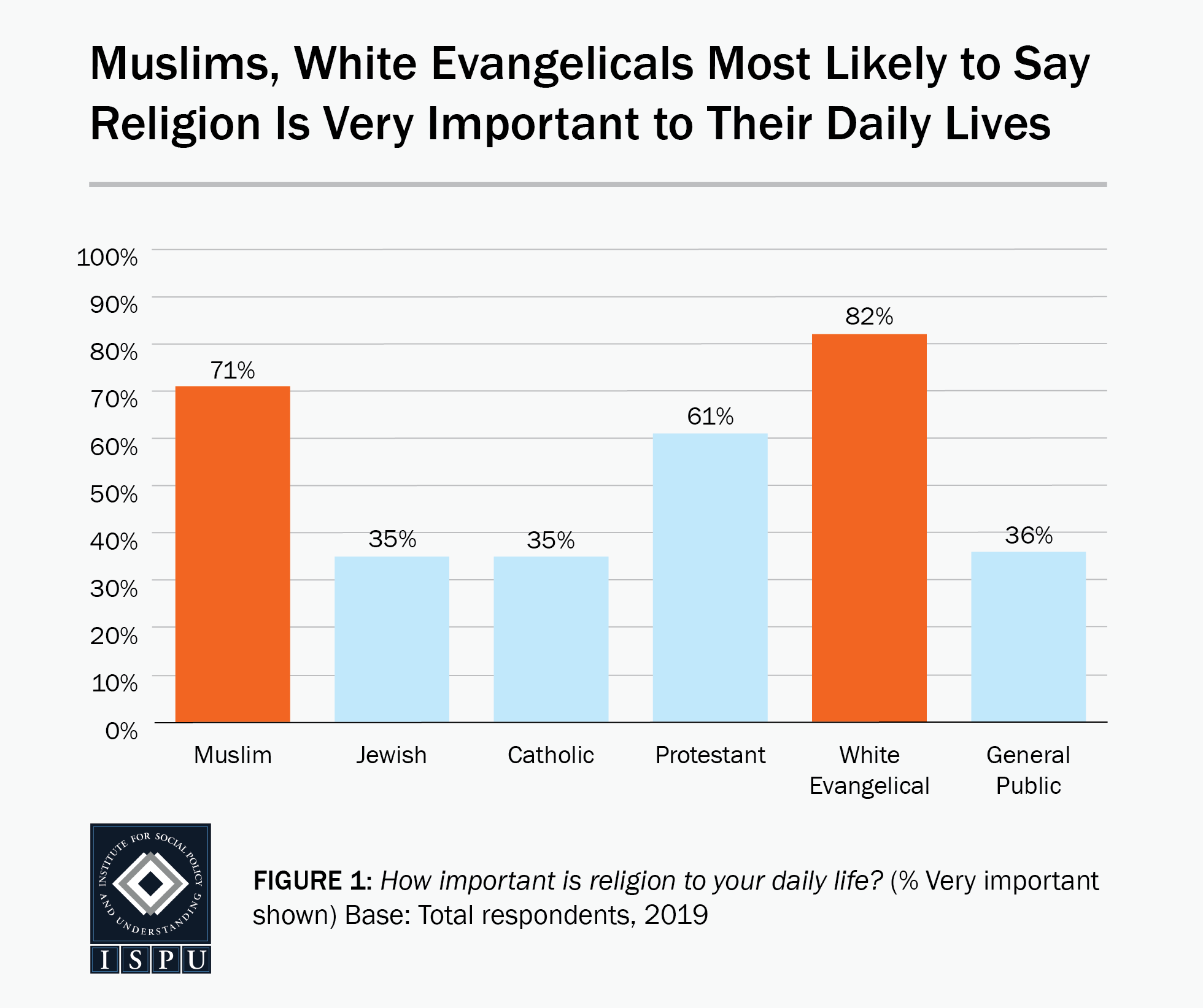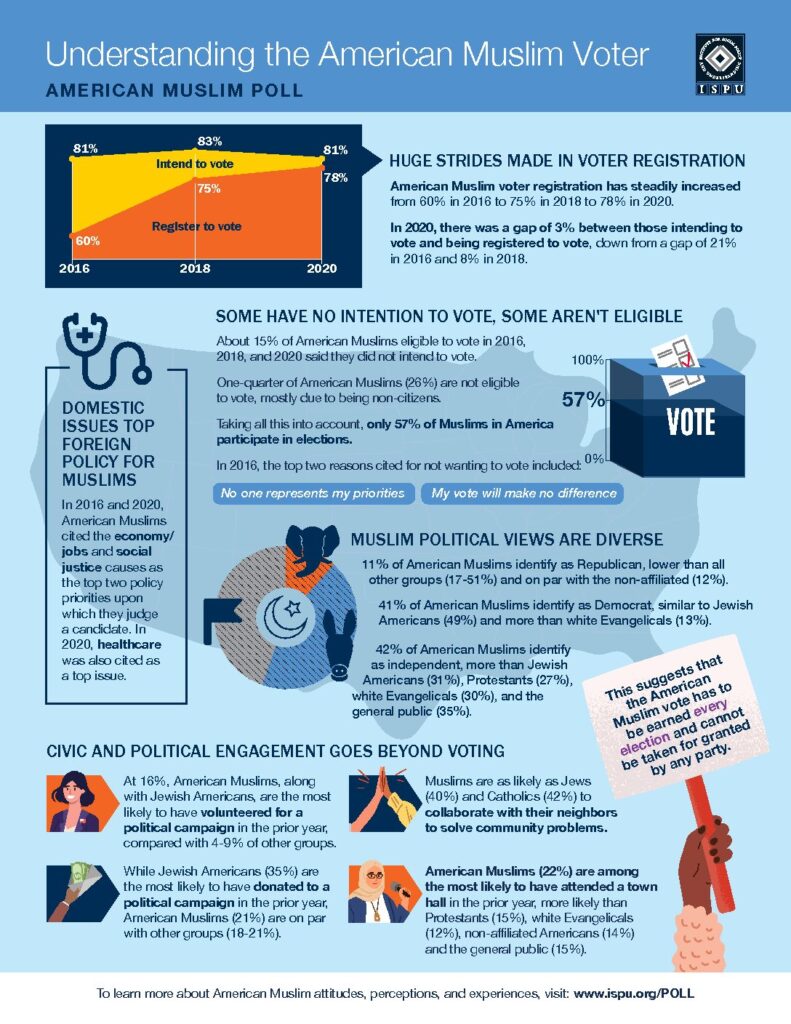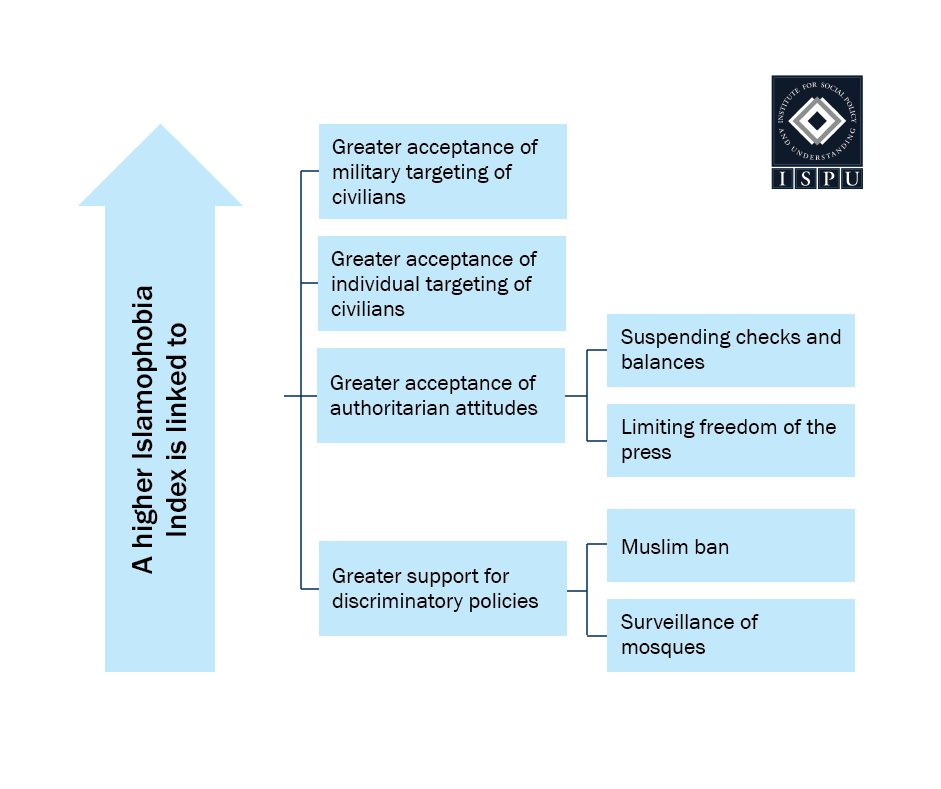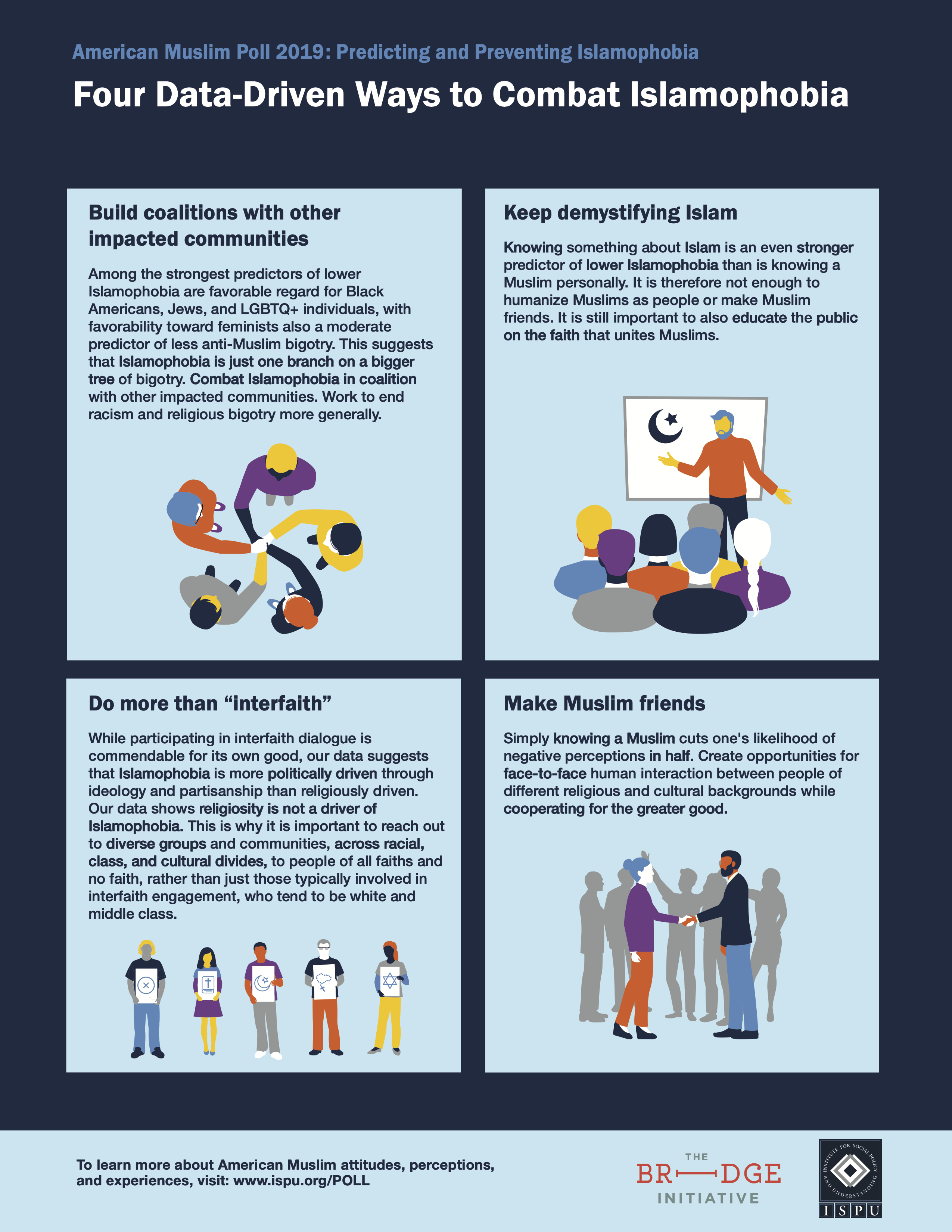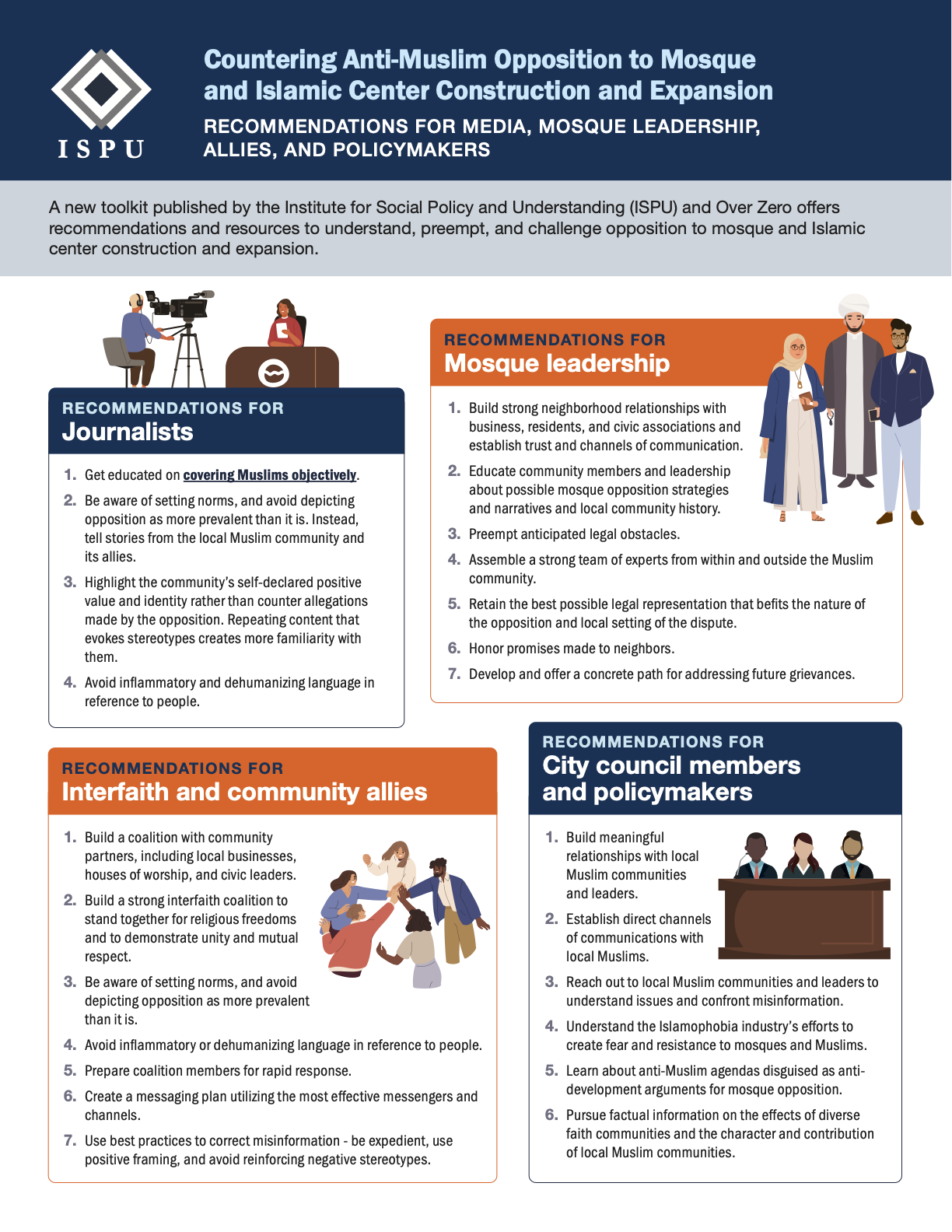
Understanding the prevalence, manifestations, and consequences of anti-Muslim bigotry
For more than 20 years, the Institute for Social Policy and Understanding (ISPU) has conducted and shared research on American Muslims and the issues impacting upon Muslim communities in the United States. Since 2016, that research has included several editions of the American Muslim Poll, which captures the attitudes, opinions, and lived experiences of Muslims, alongside Americans of other or no faith. These studies, taken together, provide a robust understanding of the prevalence, manifestations, and consequences of anti-Muslim bigotry as well as responses to it. What follows is a snapshot of what we currently know based on key findings of select reports.
Note: In 2023, in response to events in Palestine and Israel, ISPU compiled a resource addressing the ramifications of the worsening crisis overseas in the American context, including Islamophobic, anti-Arab, and antisemitic actions and incidents. Explore the resource here.

Islamophobia is Pervasive, Systemic, and a Threat to All
Understanding the prevalence, manifestations, and consequences of anti-Muslim bigotry
For more than 20 years, the Institute for Social Policy and Understanding (ISPU) has conducted and shared research on American Muslims and the issues impacting upon Muslim communities in the United States. Since 2016, that research has included several editions of the American Muslim Poll, which captures the attitudes, opinions, and lived experiences of Muslims, alongside Americans of other or no faith. These studies, taken together, provide a robust understanding of the prevalence, manifestations, and consequences of anti-Muslim bigotry as well as responses to it. What follows is a snapshot of what we currently know based on key findings of select reports.
Islamophobia is Pervasive:
-
- Anti-Muslim discrimination has been sustained at high levels since we started tracking in 2016 with the majority (62%) of Muslim adults experiencing at least one incident each year, more likely than all other faith and non-faith groups surveyed.
- For Muslims, interpersonal discrimination is common and pervasive. Muslims are the most likely faith group to report experiencing interpersonal discrimination, in settings such as when interacting with others on social media (56%), at work or at school (42%), or when interacting with strangers in a public place (49%).
- Muslim children are not immune from experiencing discrimination based on their faith. In fact, Muslim families are most likely to report a child has faced religious-based bullying:
- In 2022, half of the Muslim families with a child/children in K-12 schools say their child has been bullied for their faith in the past year (48% vs. 18% in the general public).
- Alarmingly, 20% of Muslim families report that bullying happens nearly every day.
- Four in ten Muslim families who’ve experienced bullying (42%) say the bully was a teacher or school official at school and roughly one in five say the bully was a teacher or school official online (19%). These findings shed light on cyberbullying as a major issue Muslim families face.

Islamophobia is Systemic and Institutionalized:
Discrimination in Institutional Settings
Muslims are disproportionately impacted by institutionalized religious discrimination across a number of sectors:
Travel
-
- Nearly half (44%) of Muslims who report experiencing discrimination, identify the airport as where it happened. This compares to 3% of Jews and 11% of the general public.
- In fact, Muslims are twice as likely to face secondary screening when entering the United States.
- Muslims are also the most likely faith group we studied to report that their appearance when stopped made them easily identifiable as a member of their faith community (67% of Muslims and 32% of Jews, but virtually no Catholics or Protestants).
Free Worship
-
- Institutional discrimination occurs when worshiping. Neighborhood and zoning board resistance to mosque and Islamic center development has increased since 2010, hampering community development and much-needed services, both spiritual and otherwise:
- According to the US Mosque Survey 2020, co-published in 2021 by ISPU, in the past decade (2010-2019), 35% of mosques encountered significant resistance from their neighborhood or city when they tried to obtain permission to move, expand, or build. In comparison, from 1980-2009 the average percentage of mosques that met resistance was 25%. Apparently, negative attitudes toward Muslims grew in the last decade.
- Institutional discrimination occurs when worshiping. Neighborhood and zoning board resistance to mosque and Islamic center development has increased since 2010, hampering community development and much-needed services, both spiritual and otherwise:
Political Participation
-
- Muslims also face obstacles to civic engagement and voting:
- 46% of Muslims who are eligible to vote have experienced some obstacle to casting their vote, more so than any other group surveyed (24% of Jews, 21% of Catholics, 12% of Protestants, 10% of white Evangelicals, 26% of the nonaffiliated, and 19% of the general public).
- Among eligible voters, Muslim men were more likely than Muslim women to report facing obstacles to voting (52% vs. 38%, respectively).
- Muslims also face obstacles to civic engagement and voting:
In Banking and on Financial Platforms
ISPU has published a new analysis of the experience of American Muslims (individuals and organizations) with banking systems in the United States.
-
- Members of the general public, alongside representative Muslim and Jewish oversamples, were asked whether they ever experienced challenges working with US banking and financial institutions. Challenges may include (but are not limited to): being denied opening an account, having an account suspended or closed, or having payments you made under investigation.
- We found that Muslims are significantly more likely than all other groups surveyed to report such difficulties. Whereas the proportion of the general public and Jews that have had these experiences are similar (12% vs. 14%, respectively), Muslims are about twice as likely to report challenges at financial institutions, at 27%. This is on par with Black Americans (who make up roughly one-third of the Muslim population in the United States) overall.
- Among those who report challenges with financial institutions, Muslims (64%) are more than twice as likely as the general public (26%) to have difficulties with business accounts. The most commonly cited challenges Muslims face with business accounts include: 22% who had a business bank account placed under investigation for sending payments to others, 21% who were denied having payment sent/received from business accounts on PayPal/Venmo and other similar tools, and 19% each who were denied sending payments to others from a business account and had a business credit card closed.
- Among those who report challenges with financial institutions, Muslims are also more likely than the general public to face these challenges with nonprofit accounts (62% vs. 17%). Muslims who faced banking challenges with nonprofit accounts most often cited having a credit card closed for a nonprofit account (21%) and being denied opening a nonprofit bank account (20%).
- One-quarter of Muslims (24%) who faced banking challenges were told a keyword in their transaction was a red flag, compared with 4% of the general public.
- This survey data on banking challenges seem to support the theory, and anecdotal evidence, that financial institutions are disproportionately placing Muslims under suspicion and limiting account actions.
Within the Legal System and Media Reporting
In 2018, ISPU released a major study examining the discrepancies, depending on the identity of the accused perpetrator, in the legal system and media related to the treatment of ideologically motivated violence. “Equal Treatment?: Measuring the Legal and Media Responses to Ideologically Motivated Violence in the United States“ examines violent white supremacy, anti-government violence, violence committed in the name of Islam, and other types of ideologically motivated violence. We found:
-
- When comparing similar foiled plots of ideologically motivated violence, accused Muslim-perceived defendants face far greater legal consequences than their non-Muslim perceived (white supremacist or anti-government) counterparts accused of a similar attempted crime, and receive more media coverage and public communication from the Department of Justice.
- On average, prosecutors sought three times the sentence length for accused Muslim perpetrators as for accused perpetrators not identified as Muslim for similar, comparable plots of attempted ideologically motivated violence (230 months vs. 76 months). Additionally, Muslim perpetrators received four times the average sentence as their non-Muslim perceived (white supremacist or anti-government) counterparts accused of a similar attempted crime (211 months vs. 53 months).
- Moreover, undercover law enforcement or an informant provided the means of the crime (such as a firearm or inert bomb) in a majority (two-thirds) of convictions in foiled plots involving a perceived Muslim perpetrator, but in a small fraction (two out of twelve) of those involving a non-Muslim perpetrator.
- In terms of print media coverage, Muslim-perceived perpetrators received twice the absolute quantity of media coverage as their non-Muslim counterparts in the case of violent acts carried out. For foiled plots, they received seven and half times the media coverage as their non-Muslim counterparts.
- The U.S. Department of Justice issued press releases from its national office six times as often in regard to violent plots by Muslim-perceived perpetrators in comparison to violent plots by non-Muslim-perceived perpetrators.
- Among US Muslims overall, among the roughly 60% who say they have experienced discrimination in the previous year because of their faith, more than a third (38%) identified the source of this bias as occurring when interacting with law enforcement (38% of Muslims vs. 9% of Jews and 10% of the general public).
Employment, Healthcare, and Social Media Platforms
-
- When applying for a job (37% of Muslims vs. 5% of Jews and 6% of the general public)
- When receiving healthcare (27% vs. 5% of Jews and 8% of the general public)
- On and from social media platforms (46% vs. 34% of Jews and 36% of the general public).
- Muslim men are more likely than their female co-religionists (53% vs. 39%, respectively) to report experiencing discrimination on these platforms.
- This may manifest in several ways, including having messages removed, accounts suspended or closed, or being completely kicked off a platform.
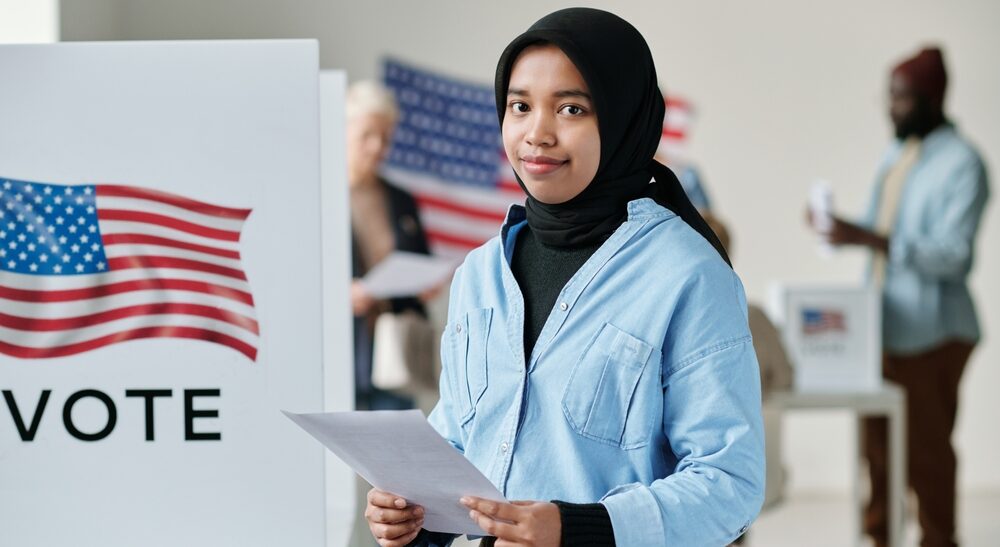
Muslims Respond to These Challenges Through Increased Civic Participation and Faith
-
- Over time, American Muslim voter registration has increased significantly from 60% in 2016 to 81% in 2022. This reflects the efforts of various voter registration drives, and the work of American Muslim civic organizations.
- At 16%, American Muslims, along with Jewish Americans, are the most likely to have volunteered for a political campaign in the prior year, compared with 4-9% of other groups.
- American Muslims (22%) are among the most likely to have attended a town hall in the prior year, more likely than Protestants (15%), white Evangelicals (12%), non-affiliated Americans (14%), and the general public (15%).
- Across age groups, Muslims (71%) are far more likely than other religious groups we studied to say religion is “very important to their daily lives.” Muslim women and men are equally likely to say religion is important to them, despite the greater social cost that Muslim women incur for their faith identity in the form of a greater frequency of reported religious discrimination (55% of men vs. 68% of women).
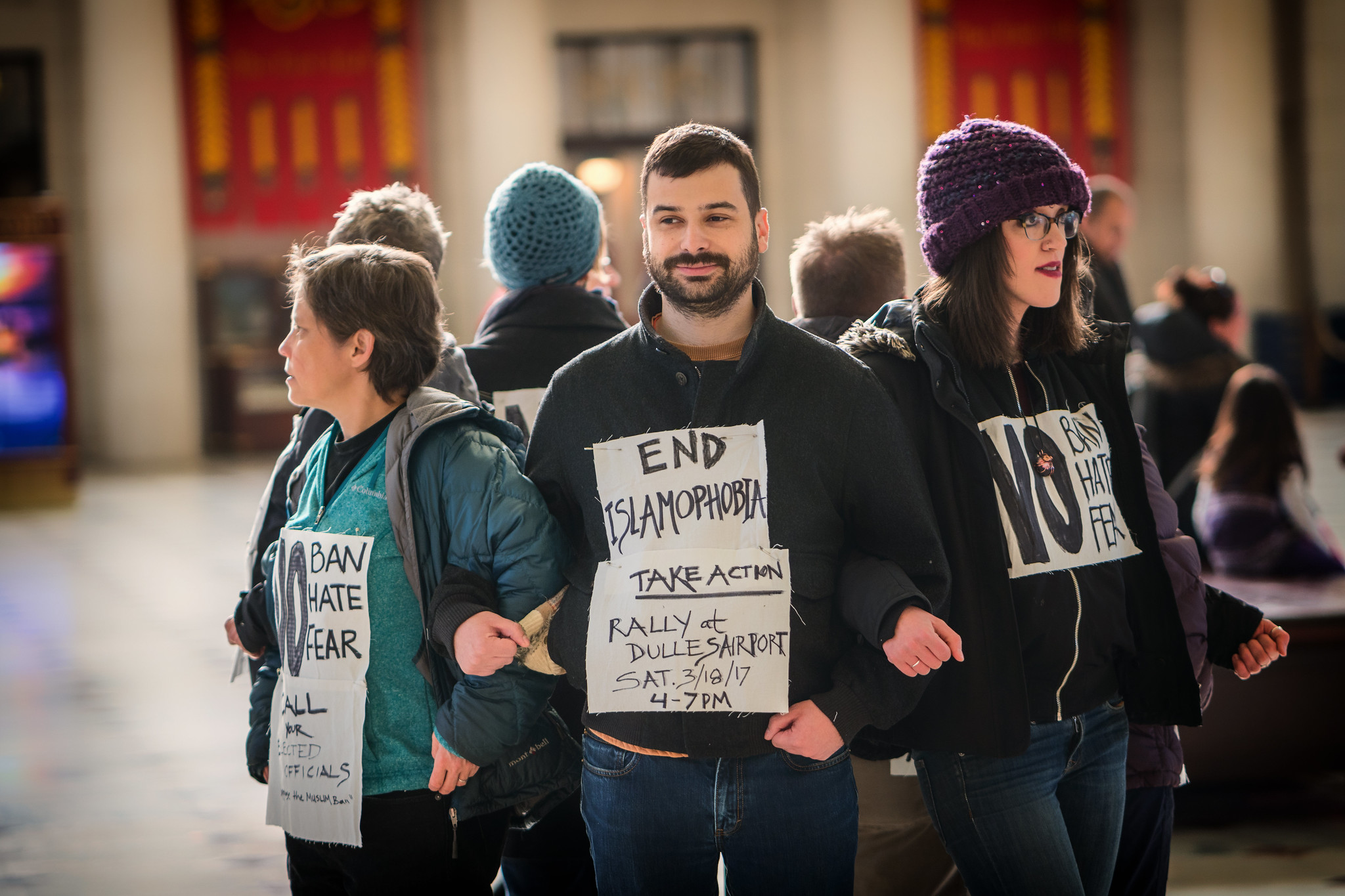
-
- Manifestations of Islamophobia hinder individual potential and community development among Muslims.
- Institutionalized Islamophobia can contribute to interpersonal Islamophobia, signaling acceptance from the top down.
- The harms of Islamophobia are not confined to Muslims, but also those perceived to be Muslim.
- Islamophobia is but a “branch on the tree of -isms,” with the same roots, empirically linked to antisemitism and anti-Black racism.
- Islamophobia is a threat to democracy. Those who harbor anti-Muslim sentiment are more likely to approve of discriminatory policies targeting Muslims and agree to limit democratic freedoms when the country is under threat.
Tools for Responding to Islamophobia:
Countering and Dismantling Islamophobia: A Comprehensive Guide for Individuals and Organizations
This toolkit, a joint effort published by the Institute for Social Policy and Understanding, America Indivisible, Western States Center, and Shoulder to Shoulder, is a resource for both short-term and long-term use. In times of crisis, this guide will serve as a reactive rapid response toolkit for immediate actions to address and stymie Islamophobia. At the same time, the information provides several proactive long-term opportunities to address systemic challenges through education and coalition-oriented ideas.
Four Data-Driven Ways to Combat Islamophobia
This infographic from our American Muslim Poll 2019: Predicting and Preventing Islamophobia, shows four data-driven ways to combat Islamophobia at the individual and community levels.
Countering Anti-Muslim Opposition to Mosque and Islamic Center Construction and Expansion: Recommendations for Media, Mosque Leadership, Allies, and Policymakers
This toolkit and infographic offers recommendations and resources to understand, preempt, and challenge opposition to mosque and Islamic center construction and expansion.
ISPU provides objective research and education about American Muslims to support well-informed dialogue and decision-making. Since 2002, ISPU has been at the forefront of discovering trends and opportunities that impact American Muslim communities. Our research aims to educate the general public and equip community change agents, the media, policymakers, and others to make evidence-based decisions. In addition to building in-house capacity, ISPU has assembled leading experts across multiple disciplines, building a solid reputation as a trusted source for information for and about American Muslims.
We are happy to answer questions or discuss these data further in any capacity. Additional research and expert insight is available at ISPU.org and by contacting us at info@ispu.org.
About the authors:

Dalia Mogahed is the Director of Research at the Institute for Social Policy and Understanding, where she leads the organization’s pioneering research and thought leadership programs on American Muslims. Learn more about Dalia→

Meira Neggaz is the Executive Director of ISPU, where she is responsible for the institution’s overall leadership, strategy, and growth. Learn more about Meira→

Petra Alsoofy is the Outreach & Partnerships Manager at ISPU, where she strengthens valued partnerships and forges new ones with organizations who share ISPU’s goal of strengthening Muslim communities and building understanding. Learn more about Petra→


